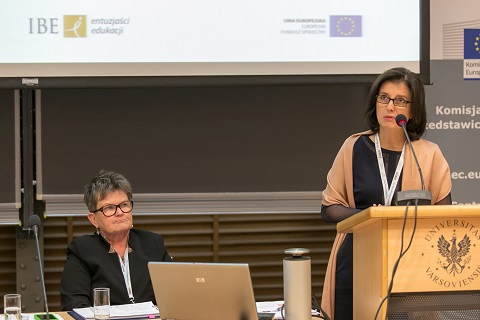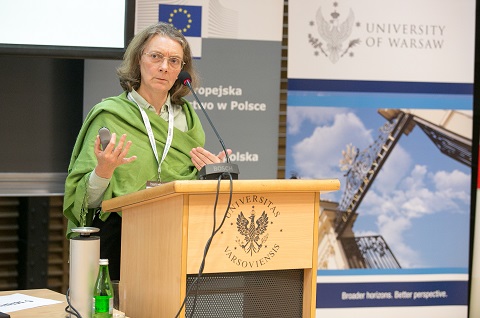Key to foreign language teaching
- Published on Thursday, 26 September 2013 21:25
Motivation in foreign language teaching is essential - how can we improve it at school? This topic was brought up at the conference in Warsaw.
 Madgalena Szpotowicz, PhD, from IBE (on the right) during the Conference in Warsaw.
Madgalena Szpotowicz, PhD, from IBE (on the right) during the Conference in Warsaw.
About 360 people participated in the international conference “Motivation in language education” which was held on 24 September 2013 in Warsaw. The event was part of the European Day of Foreign Languages.
To overcome the fear
Melanie Ellis, PhD (IBE), explained that speaking in a foreign language activates many complex processes, often under the pressure of time, which may result in the increased level of stress for the speaker. Moreover, she said, the very unnaturalness of speaking to peers in a foreign language in a monolingual class may be a significant barrier. It is easier for students to switch into the mother tongue than to struggle with limited vocabulary of a foreign language.
According to Ms Ellis, who was a guest speaker in the “Motivation in Methodology, Method in Motivation”session, one of the key motivational factors for learning foreign languages is the desire to communicate – the desire all too often compromised by the fear of speaking in the language. The fear may manifest itself on three levels: a learner, an oral exercises during a lesson and in the specific teaching situation. What can be done to reduce the fear of speaking in a foreign language? IBE researcher suggested, among others, that one should empathize with his/her pupils and students’ situation and pay closer attention to how much time is devoted to more practical aspects of teaching - speaking and writing exercises. She also pointed out that the fear can be overcome through increasing awareness, setting goals, appropriate choice of oral activities and a tactful approach to grading. Ms Ellis suggested that one should always bear in mind the relative deficit of the amount of instruction time students have for practical language exercises.
 Melanie Ellis, PhD, speaking at the conference “Motivation in language education”
Melanie Ellis, PhD, speaking at the conference “Motivation in language education”
What do the studies show?
At the end of the plenary session Magdalena Szpotowicz, PhD, speaking about the role of children’s and youth motivation and attitudes towards foreign language learning, stated that the studies carried out in elementary schools and in lower secondary schools clearly show that both motivation and attitudes are crucial for rasining the level of students’ skills. “Emotions in learning are especially important, without them there is no motivation – she emphasized while discussing the factors influencing children’s performance in foreign language classes. Ms Szpotowicz shared her experiences of the survey studies and interviews carried out with Polish students – participants of the ELLiE (2010) and ESLC (2011) studies. The report on the findings of the second study are available on the website of the IBE project ”Education Enthusiasts”.
Comparing generally positive findings of the ESLC study, however, with the results of Polish lower secondary school students, Ms Szpotowicz noted that the majority of young Poles are still at the elementary level of their language proficiency, or even lower. “Do we set requirements high enough when teaching foreign languages at lower secondary school?” she asked.
The conference “Motivation in language education” was organised by the Foundation for the Development of the Education System, the Ministry of National Education (MEN), European Union of National Institutes of Culture (EUNIC), the European Commission representatives in Poland and the University of Warsaw in cooperation with the European Centre for Modern Languages, the Centre for Education Development (ORE) and the Department of Education of the city of Warsaw.
The conference was organised under the auspices of the Minister of National Education, the Minister of Science and Higher Education and the Rector of the University of Warsaw.







